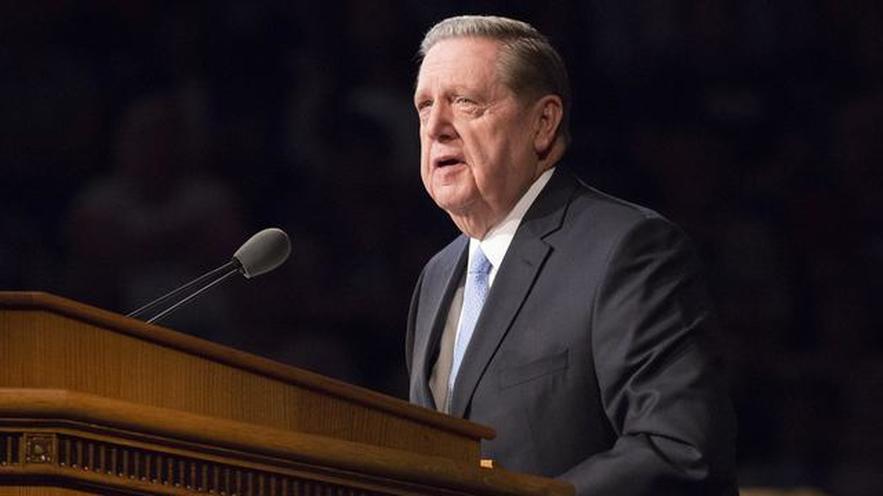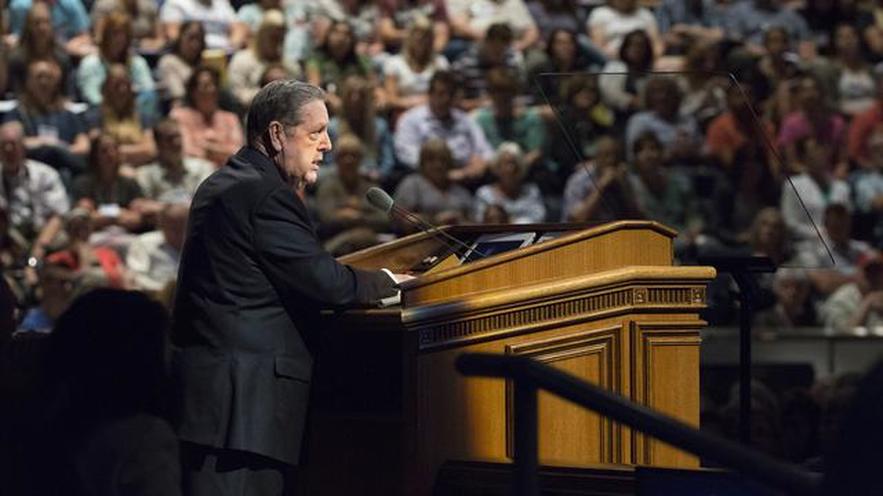Salt Lake City, Utah
Elder Holland spoke about the need for religion in society due to a “rise of secularism” at a devotional during Brigham Young University’s annual Education Week on the Provo campus, Tuesday morning, August 16, 2016.
“Call it secularism or modernity or the technological age or existentialism on steroids — whatever you want to call such an approach to life, we do know a thing or two about it,” said Elder Holland. “Most importantly we know that it cannot answer the yearning questions of the soul, nor is it substantial enough to sustain us in times of moral crises.”
Elder Holland said modern technology has given us “unprecedented personal freedom” and “access to virtually unlimited knowledge,” but he added that “neither technology nor its worthy parent science can give us much moral guidance as to how to use that freedom.”
Speaking in the Marriott Center, the Mormon apostle said there is a “marked disenchantment with religion,” but he said religion allows us to overcome the trials we face in life.
“What is equally obvious is that the great conflict between good and evil, right and wrong, the moral and the immoral — conflict which the world’s great faiths and devoted religious believers have historically tried to address — is being intensified in our time and is affecting an ever-wider segment of our culture,” said Elder Holland.
“We are grateful that a large segment of the human population does have some form of religious belief. … But no one can say we are not seeing some glaciers on the move,” he added.
“Many of our ancestors in generations past lived, breathed, walked, and talked in a world full of ‘spirituality,’ but that clearly included concern for the state of one’s soul, an attempt to live a righteous life, some form of church attendance, and participation in that congregation’s charitable service in the community,” Elder Holland stressed.
“In more modern times individuals can certainly be ‘spiritual’ in isolation, but we don’t live in isolation; we live as families, friends, neighbors, and nations. That calls for ties that bind us together and bind us to the good. That is what religion does for our society,” he emphasized.
Elder Holland said religion has been the principle influence that has kept Western social, political and cultural life moral. “I shudder at how immoral life might have been — then and now — without that influence.”
“Voices of religious faith have elevated our vision, deepened our human conversation, and strengthened both our personal and collective aspiration since time began,” he added, referring to modern-day religious leaders and prophets and apostles of old.
“So the core landscape of history has been sketched by the pen and brush and words of those who invoke a divine creator’s involvement in our lives and who count on the ligatures of religion to bind up our wounds and help us hold things together,” explained Elder Holland.
Elder Holland worries that religion could be found at the margins instead of at the center of society, where religious beliefs may be tolerated privately but not encouraged publicly. In his address, he cited a concern Elder Neal A. Maxwell of the Quorum of the Twelve Apostles voiced during a BYU devotional in 1978.
“Only in the living of our religion will the preservation of it have true meaning,” Elder Holland concluded.
Moroni Channel News
Latest posts by Moroni Channel News (see all)
- 9-year-old primary killed while riding bike - June 26, 2025
- 8 young women died during church activity - June 26, 2025
- LDS Church yet to issue official statement on reported Missionary kidnapping in Congo - June 21, 2025
- Utah Native Finds Success on Broadway and HBO’s Gilded Age - June 19, 2025



